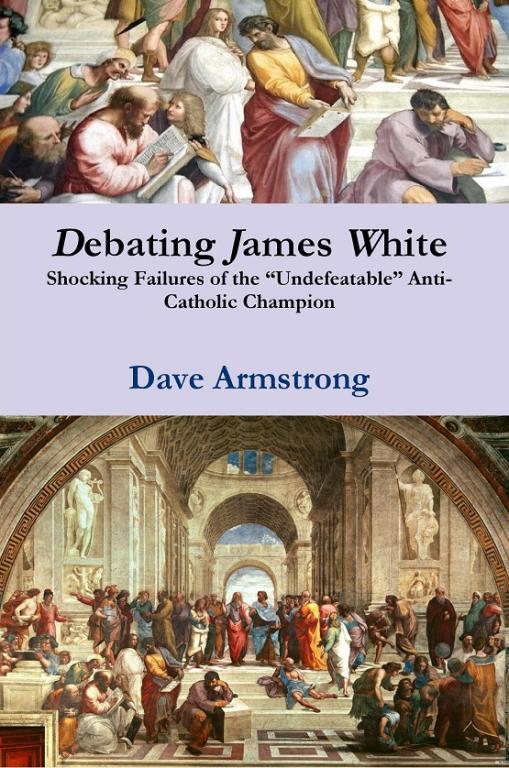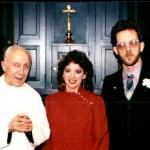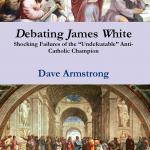Part I: Introduction and My Initial Form Letter (23 March 1995)

My book (2013, 395 pages; available for as low as $2.99).
* * * * *
This newer Introduction was written in 12-2-15 and re-edited a bit on 11-6-17.
***
Complete Debate:
Part I: Introduction and My Initial Form Letter (23 March 1995)
Part II: Mr. White’s 7-Page Initial Reply (6 April 1995)
Part III: My 16-Page First Counter-Reply (22 April 1995)
Part IV: Mr. White’s 17-Page Second Counter-Reply (4 May 1995)
Part V: My 36-Page Second Counter-Reply (15 May 1995) and Mr. White’s One-Page “Reply” (10 November 1995)
***
James White: Reformed Baptist elder and director of Alpha and Omega Ministries, is the most influential anti-Catholic polemicist today. He’s written a ton of books (though not all about Catholicism), does lots of oral debates, and has had a website for some 20 years now. He is the author of several books against Catholic teaching, including The Fatal Flaw (1990) and The Roman Catholic Controversy (1996).
He also does some good and useful work, such as countering silly claims that the King James Version of the Bible is the only valid one, and refuting various heretical cults such as Mormons and Jehovah’s Witnesses, and also Islam. But like so many in his broad denominational outlook, he classifies the Catholic Church as a sub-Christian, essentially deceptive organization.
Hang around anti-Catholics much and you’ll hear his name pretty soon, and often. He’s their big champion. The anti-Catholic is one who thinks that Catholicism is not a species of Christianity; that one cannot be saved while being a good Catholic (accepting all that the Church teaches). One can be saved, however (so they tell us) by being a “bad Catholic” (i.e., picking and choosing Catholic doctrines).
In 1995 I ran across his name in a directory of cult researchers (that I was also listed in, since specializing in cults was one of my first major apologetics projects). I discovered that he was anti-Catholic, along with some others in the book, and so decided to write a form letter to several, about the issue (snail mail; I was not yet on the Internet). He responded back with a lengthy letter, to which I replied very fully.
Then he wrote back again, in a far more acerbic tone, and I replied with a 36-page, single-spaced letter. At that point he resorted to severe personal insult and ceased the debate altogether. This all occurred in March-May 1995. I have the hard copies of the typewritten replies he sent me in my possession.
This was the most in-depth writing I have ever done concerning the fundamental question of the Christian status of Catholicism. I’ve never been able to get an anti-Catholic to fully deal with the issue, in an honest debate. In fact, in 2007, I was so tired of trying to get into such a discussion, that I challenged six or seven prominent anti-Catholics (including Mr. White) to a “live chat” debate on the question. They all refused: most of them with rank insults.
Because of that, I decided that I would no longer seek to engage anti-Catholics in theological debate (apart from very few exceptions), since they refused to grapple with the root issue of what Christianity is, and why they think Catholicism isn’t Christian. One can’t really have a true dialogue until fundamental differences are addressed.
Ever since 1995, White would occasionally critique something of mine: especially from my books or radio interviews. It was always the same: he started out with ostensible argument. I refuted what he wrote, then he came back with personal insults. It never went more than one round. He’s simply not interested in real, substantive debate, where the two parties actually interact with each other’s arguments. In his oral debates, he merely preaches his message, and obfuscates and spins and special pleads regarding whatever the other guy says.
We’ve had exactly one “live chat” debate, which took place in his venue on 29 December 2000: about Mary and the Church fathers. I immediately posted it on my site. He never has. He’s never posted or linked to this debate, either, even though he claims to have been victorious and chides his Catholic opponents when they are reluctant to make their debates available to the public. But I have had it on my site for many years now. But he did give me his express permission to post his words (e-mail letter of 2 February 2000).
This dialogue is one of the most in-depth and intense debates I have ever engaged in….At one point (23 January 2002) I edited the letters to remove personal, off-subject, insulting, inflammatory, ad hominem-type remarks (and responses to same), on both sides. I confess to my part in this, and would answer differently in many places today. In fact, I later apologized to Mr. White on more than one occasion for uncharitable comments on my part (no such apology has ever come from him).
But I have decided to restore the original debates, completely unedited, warts and all. I apologize for any offense caused to any readers due to inflammatory language. I’m not perfect, but I think readers will see how immensely frustrating it is to deal with such an intransigent spirit as Mr. White.
My other interactions with Mr. White can be read on my web page devoted to him, and also in my 400-page book that collects the major “exchanges” (if we can even call them that. They were mostly my refutations and his insults back or heading for the hills).
The “snail mail debate” I link to below takes up 103 pages in my book devoted to Mr. White. Needless to say, he has utterly ignored the book: never said a word about it, ever (that I am aware of). I can fully understand why . . .
* * * * *
My Two-Page Form Letter of 23 March 1995
To: James White of Alpha & Omega Ministries
Dear Mr. White,
I am a cult researcher (#248 in 1993 Directory of Cult Research Organizations, Tolbert & Pement) and Christian apologist, who converted to Catholicism in 1990 after ten years of committed evangelicalism (including five as a campus missionary). I am disturbed by the tendency among cult researchers and other leaders in Protestantism to regard the Catholic Church as “apostate” and/or non-Christian, since it supposedly denies the gospel of Jesus Christ. This is not worthy of men of your stature and theological training, and is also uncharitable, since it is slanderous and schismatic.
I’d be interested in dialoguing with you or anyone you might know (with perhaps more time on their hands) who would be willing to do so, about this matter and any or all of the theological issues which sadly divide us (enclosed is a list of my tracts and a few samples). I have been published in The Catholic Answer and This Rock, two of the leading Catholic apologetic journals, and will soon have a book out, The Credibility of Catholicism (possibly published by Ignatius Press), which is a defense of Catholicism from Scripture, the early Church, and reason, as well as a very extensive critique and examination of the so-called “Reformation” (I prefer the objective term “Revolt”). [this became A Biblical Defense of Catholicism, completed in 1996]
Catholicism is not only Christian — it is far superior to Protestantism on biblical, historical, and rational grounds. Secondly, I would say that a position maintaining that Protestantism is Christian while Catholicism is not, is self-defeating, incoherent, and intellectually dishonest, if thought through properly (which is rarely the case). I never had this outlook as a Protestant for these very reasons.
Among the many insuperable difficulties of anti-Catholicism:
1) The Canon of the Bible was determined by the Catholic Church. Thus, “sola Scriptura” necessarily requires a Tradition and Catholic (conciliar and papal) Authority. Not to mention the preservation of Bible manuscripts by monks.
2) At what moment did Catholicism become apostate? At John’s death? In 313? With Gregory the Great and the ascendancy of papal power? In the “Dark Ages” of c.800-1100? With the Inquisition or Crusades? Or at the Council of Trent? And how can anyone know for sure when?
3) 23,000 denominations [note: I have long since ceased using this number] and the scandalous organizational anarchy, schism, and theological relativism inherent therein virtually disproves Protestantism in and of itself.
4) Protestantism has only been around for 477 years!
5) If the Inquisition disproves Catholicism, then the Witch Hunts and killings of Anabaptists, the suppression of the Peasants’ Revolt, and early Protestantism’s horrendous record of intolerance (at least as bad as Catholicism’s by any criterion) disproves Protestantism as well.
6) Protestantism inconsistently and dishonestly appeals to indisputably Catholic Church Fathers such as St. Auqustine (above all) St. John Chrysostom, St. Jerome, St. Ignatius, St. Irenaeus, St. Justin Martyr (also, later Catholics such as St. Francis, St. Thomas Aquinas, and Thomas a Kempis).
7) Likewise, it inconsistently appeals to Church Councils which it likes (generally the first four) and ignores the rest, on questionable theological and ecclesiological grounds. Development of doctrine is accepted to an extent, and then incoherently rejected. This is largely what made me a Catholic, after reading Newman’s Development of Doctrine.
8) Funny how an “apostate” Church has uniquely preserved traditional Christian morality such as the indissolubility of marriage, gender roles, the prohibition of contraception, euthanasia, infanticide, abortion, etc., while Protestantism is compromising these with frightening rapidity.
“Sola fide” is not the gospel. If so, then there wasn’t a gospel to speak of for 1500-odd years, since “sola fide” was a radically novel and unbiblical interpretation of justification and sanctification. The God I serve is greater than that– His hands weren’t tied until Dr. Luther figured everything out! Related to this is the slanderous assertion that Catholics are Pelagian or semi-Pelagian and believe in salvation by works. Nothing could be further from the truth. We merely refuse to separate works from faith in a dichotomous relationship as Luther did (which is why he wanted to throw out James– so clear was its Catholic teaching). Catholicism condemned Pelagianism at the 2nd Council of Orange in 529 A.D., almost 1000 years before Luther. The very first Canon on Justification in the Council of Trent states:
“If anyone saith that man may be justified before God by his own works, whether done through the teaching of human nature or that of the law, without the grace of God through Jesus Christ; let him be anathema.”
This would seem to be sufficient to put the matter to rest. But blind prejudice and anti-Catholicism stubbornly persist.
Many other biblical proofs for Catholicism are in my apologetic works, if you’re interested. Thanks for your time.
Sincerely, your brother and co-laborer in Christ,
Dave Armstrong
* * * * *













